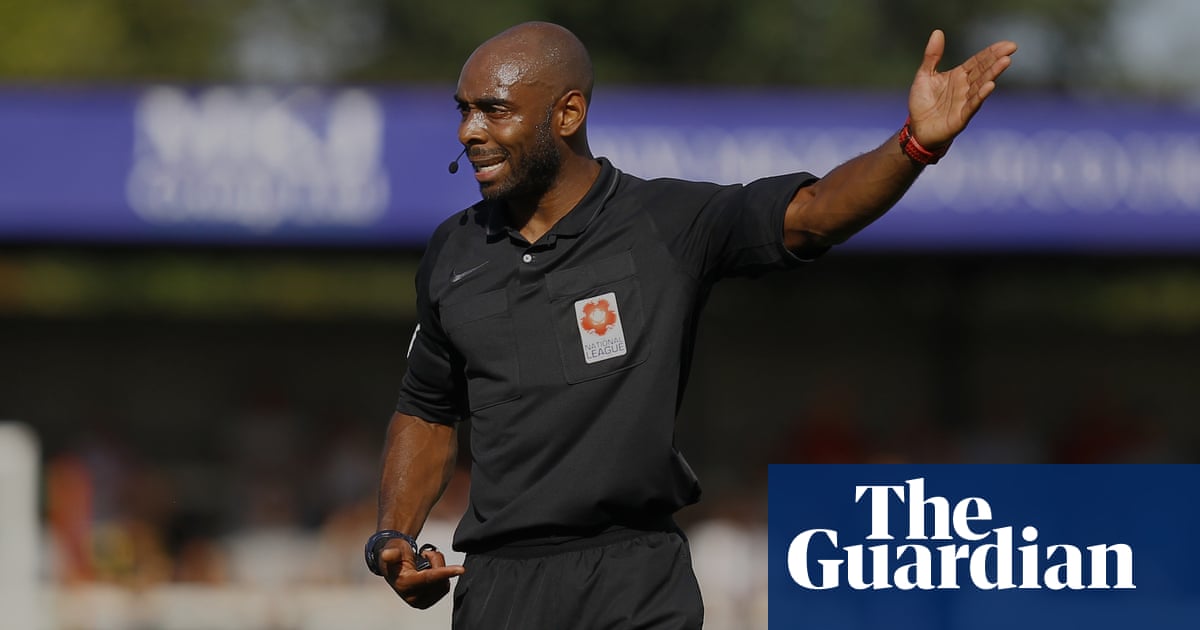
“Yeah, I’m proud,” says Sam Allison. “I’m proud of myself and I don’t usually say that. I’ve never really been great at giving myself any kind of reward, I’ve been self-critical, because I’ve always thought by praising myself I’m wasting time. But I just couldn’t hold back the jubilation when the call came through. I’m over the moon, I’m really really excited and happy.”
Allison, 39, is the latest addition to the national list of professional referees. Next season he will take charge of games in Leagues One and Two, a far cry from the five-a-side leagues he has refereed, or the 200 or so games he has taken charge of at county level. He will also be the only black match official in the top four English divisions and the first since Uriah Rennie retired more than a decade ago.
“The last four or five weeks my head has been like scrambled egg,” Allison says. “I’ve been a pain in the house, I’ve just been getting ready for this day. You want to do such a good job because of the position you’re in, and you’re representing everyone who looks like you too. I’m not just doing it for me, I’m doing it for everyone else, I want to give the best account possible. I want to leave no stone unturned.”
It’s unusual to be able to speak to someone just as they are processing the biggest professional news of their life, something they have worked so hard to achieve. Allison’s emotions on the day are real, his joy unconfined, his thoughts unscripted. But his clarity of purpose and focus are what strike the most, and give a clear hint as to why he has been able to break down a door that has been closed for too long.
“As a black man in this world there are challenges, there are barriers, but when I relate it personally to refereeing it’s difficult to say I’ve had any barriers that I’m aware of because I’ve come through the system quite quickly,” he says. “I’m not saying I’ve been blinkered about what’s happened in these last few months in terms of racism and Black Lives Matter. It holds deeply, it’s heavily burdened on my heart. But you can only control what you can, and you can try and educate, and eradicate what you can. I feel I’ve done my apprenticeship, I’ve done my learning. I’ve got to my position and have not allowed anything to prevent me from being successful.”
Allison is quick to point out those who have helped him along his journey. A firefighter by trade, he thanks his colleagues for stepping up to cover when he had to referee a game. He thanks his family, and his old teammates from when he was a player with Chippenham Town. Allison also names his mentors off the field, such as the Chippenham club secretary, George McCaffrey, who encouraged him to become a referee. “I looked at him as if to say: ‘How dare you, have you not seen me on the pitch?’” says Allison, who admits to having berated referees as a player.
“There’s a lot going on at the moment trying to encourage people from black, Asian and minority ethnic groups, LGBT people too, which is what we should be doing,” Allison says. “It’s got to be a one-team approach in order to reflect the communities you’re supposed to serve. I do feel that I have to work twice as hard but if you’re being successful you don’t know whether it’s because you’ve got that determination and drive. You also have to be brave to take that step and say: ‘Yeah, I am going to do it.’ You’ve got to try and bang the doors down, but the doors are opening now.”
Thanks to the firefighting, Allison considers himself well-placed to keep up with the pace of the professional game. “We do a lot of physical training with work, so that helps,” he says. He describes his refereeing style as trying to “allow the game to breathe a bit”, and admits the biggest challenge has been adapting from the mindset of a player who wants to support his teammates, to becoming someone who is likely to be disliked by at least half of the people he’s working with.
“At the end of the day, if I can be seen as a good referee then that’s fantastic, but normally 50% of people are going to think you’re not great because they’ve been on the receiving end of getting beat,” he says. “But I’ve got such a passion for the game and making sure I do the job to the best of my ability. If I can do that and nobody is talking about me at the end of the game, that’s what it’s all about.”
from Football | The Guardian https://ift.tt/3kN8ucz
via IFTTT

No Comment